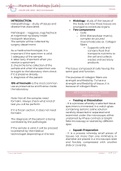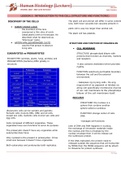Bellaraisins
On this page, you find all documents, package deals, and flashcards offered by seller bellaraisins.
- 3
- 0
- 0
Community
- Followers
- Following
3 items

Anatomy and Physiology Exam (elaborations) MLS - Medical Laboratory Scientist
The integumentary system includes the central nervous system, the circulatory system, the lymphatic system, and the skin. Medical laboratory scientists perform tests on specimens obtained from patients to determine if there are conditions that may be present in these systems. They may also conduct tests to determine which factors are responsible for diseases or other disruptions. The following is an explanation of some of the general concepts and procedures used in medical laboratory science
- Exam (elaborations)
- • 5 pages •
The integumentary system includes the central nervous system, the circulatory system, the lymphatic system, and the skin. Medical laboratory scientists perform tests on specimens obtained from patients to determine if there are conditions that may be present in these systems. They may also conduct tests to determine which factors are responsible for diseases or other disruptions. The following is an explanation of some of the general concepts and procedures used in medical laboratory science

Histology ( Specimens Collection Technique)
Summary or class notes about the techniques in specimen collection inside the laboratory. It explain completely what are the important to know when it comes handling specimen.
- Class notes
- • 6 pages •
Summary or class notes about the techniques in specimen collection inside the laboratory. It explain completely what are the important to know when it comes handling specimen.

Histology ( Introduction of cells and Cell division)
Cell division—the process by which a single cell divides into two new cells—is the basis for all life on Earth. You've probably heard about this before, but it's important to understand how it works so that you can better understand your own cells and how they work. In this lesson, we'll look at how cells grow, divide, and die. We'll talk about the different stages of cell division and how they relate to each other. We'll learn about some important distinctions between somatic and g...
- Class notes
- • 12 pages •
Cell division—the process by which a single cell divides into two new cells—is the basis for all life on Earth. You've probably heard about this before, but it's important to understand how it works so that you can better understand your own cells and how they work. In this lesson, we'll look at how cells grow, divide, and die. We'll talk about the different stages of cell division and how they relate to each other. We'll learn about some important distinctions between somatic and g...
